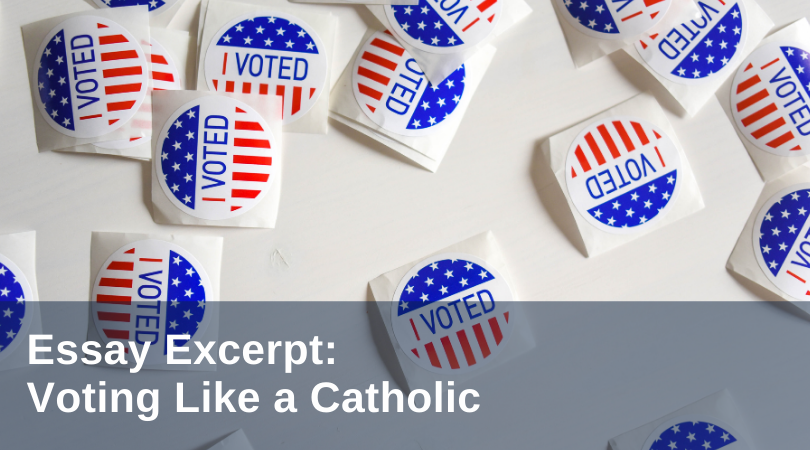
Throughout the country today, ballots will be cast. Votes will be counted. With all of the mailed-in and absentee ballots, we may not know the results for days, but today marks an end of sorts: an end to the election cycle for the time being. And yet, the aftershocks of this seismic event will continue to rumble, the waves continue to ripple out from the point of impact for the next several weeks, months, even years.
With that in mind, even if you’ve already performed your civic duty, this recent essay from the McGrath Institute's Church Life Journal—"Holding Your Nose: How to Vote Like a Catholic" by Brett Salkeld—is well worth the read. Salkeld provides a foundation not only on how to engage in the process of voting from the perspective of Church teaching, but also on how to engage in political life itself from that same perspective—something that Catholics will continue to grapple with long after polling places close today.
What follows is an excerpt from this exceptional essay, and a link to the full post. This Election Day and beyond, no matter what the results, consider thoughtfully and prayerfully how you will move forward, and most importantly, how you will live out the teachings of the Gospel as you engage in American political life and especially as you interact with people whose views differ from your own.
Consider the following: What does it mean that American Catholics who identify as Republican or Democrat typically sound more like other, non-Catholic Republicans or Democrats than we sound like one another? We are happy to point out where we believe our party comports with the Gospel, but where it does not, we far too commonly downplay the irksome bit of Church teaching instead of critiquing our party with the Gospel. (We notice this pattern quite easily, by the way, when it is done by members of the other party.) Or, like Adam hoping he could hide his own guilt by blaming Eve, we think we can excuse the evils in our own parties because the other party is ostensibly worse.
This is a scandal! It shows that our priorities are often much more easily shaped by our partisan political commitments than by our faith. This is, to put it in the stark terms of the Bible, idolatry. And this idolatry is damaging our society, our Church, and our souls.
. . .
I do not care who you vote for. But I am a theologian, and one utterly committed to the teachings of the Catholic Church. And I do care how you vote. I care how you make decisions. I care how your conscience is formed. I care how you engage with your neighbor, especially your fellow Catholic, who disagrees with you. I care how you understand and represent Church teaching in the public square. I care about whether you ignore or dismiss crucial elements of that teaching in the name of political expediency or party loyalty.
To my mind, having a Church full of Catholics who understand and are committed to Church teaching on political engagement is of vastly more importance than who wins the next election.
. . .
The good news is that a proper Catholic understanding of political participation is just what the doctor ordered. By ignoring, and in some cases even positively misrepresenting, Church teaching for short-term political gain, we have sacrificed the Church’s prophetic voice and cooperated in the crippling of democracy. But if we deepen our understanding of and commitment to Church teaching, we can play an essential role in healing this nation no matter who wins on November 3.
To read the full essay in our Church Life Journal, click the button below:



